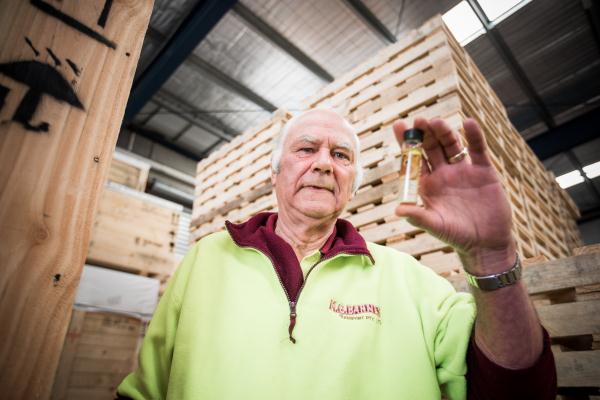By XAVIER SMERDON
Exclusive:
A COUPLE of Hoppers Crossing warehouse workers unknowingly saved Australia potentially hundreds of millions of dollars with the discovery of a dangerous insect.
In January this year Sean Mongey, the warehouse supervisor at M G Barnes Transport in Hoppers Crossing, was handed the larvae of a strange looking animal, which he described as looking like a “skinny witchetty grub”, by one of his colleagues.
He placed the seemingly innocuous creature in a jar and sent it off to quarantine, having no idea that he had potentially just saved huge sections of Australia’s wildlife.
Last week Sean, who works two days a week at the company which takes in containers from all over the world, unpacks them and transports them onto their next destination, was shocked to walk in on an award ceremony being held in his honour.
The Department of Agriculture, Fisheries and Forestry (DAAF) presented Mr Mongey with a Biosecurity Award for his actions.
“I was a little bit shocked. It’s just part of your job,” Mr Mongey said.
“We’ve found things in the past and we always send them off to quarantine, this one just happened to be a rare one.”
The creature he had discovered was later identified as an Asian Long-Horned Beetle, an eastern Asian species that hollows out hard wood trees.
Regional Manager of the South East Region at DAAF, Peter Cook, told Star the discovery of the beetle had potentially saved major parts of Victoria’s economy and environment.
“This turned out to be one of our top 10 nasties and if it did get past our borders it could have had a devastating effect,” Mr Cook said.
“In America the United States Department of Agriculture has spent more than $300 million trying to eradicate this beetle and they have literally had to cut down millions and millions of trees.
“Basically each tree is eaten from the inside out. It’s very invasive and you wouldn’t even know it’s there.”
It is estimated that the beetle could destroy one third of the USA’s entire tree population if the Asian Long-Horned Beetle is not controlled in the country.
Yard Supervisor Paul Bowler discovered the larvae of the beetle in a shipping crate and gave it to Mr Mongey.
“I’ve seen a lot of things in containers but if it’s alive then you worry a bit,” Mr Bowler said.
“We don’t expect it to be that bad though. I was totally shocked that a little thing like that could be so bad.”
Mr Bowler will also be presented an award for his actions.
Director of M G Barnes, Sue Bettiol, said she was very proud of her staff.
“It’s amazing to think that something so small could be totally devastating to the country,” Ms Bettiol said.
“They (Mr Mongey and Mr Bowler) would have unpacked thousands of containers in their time and this time it was obviously a really significant find.”
Anyone that thinks they may have discovered a biosecurity risk should visit www.daaf.gov.au or call 1800 803 006.


